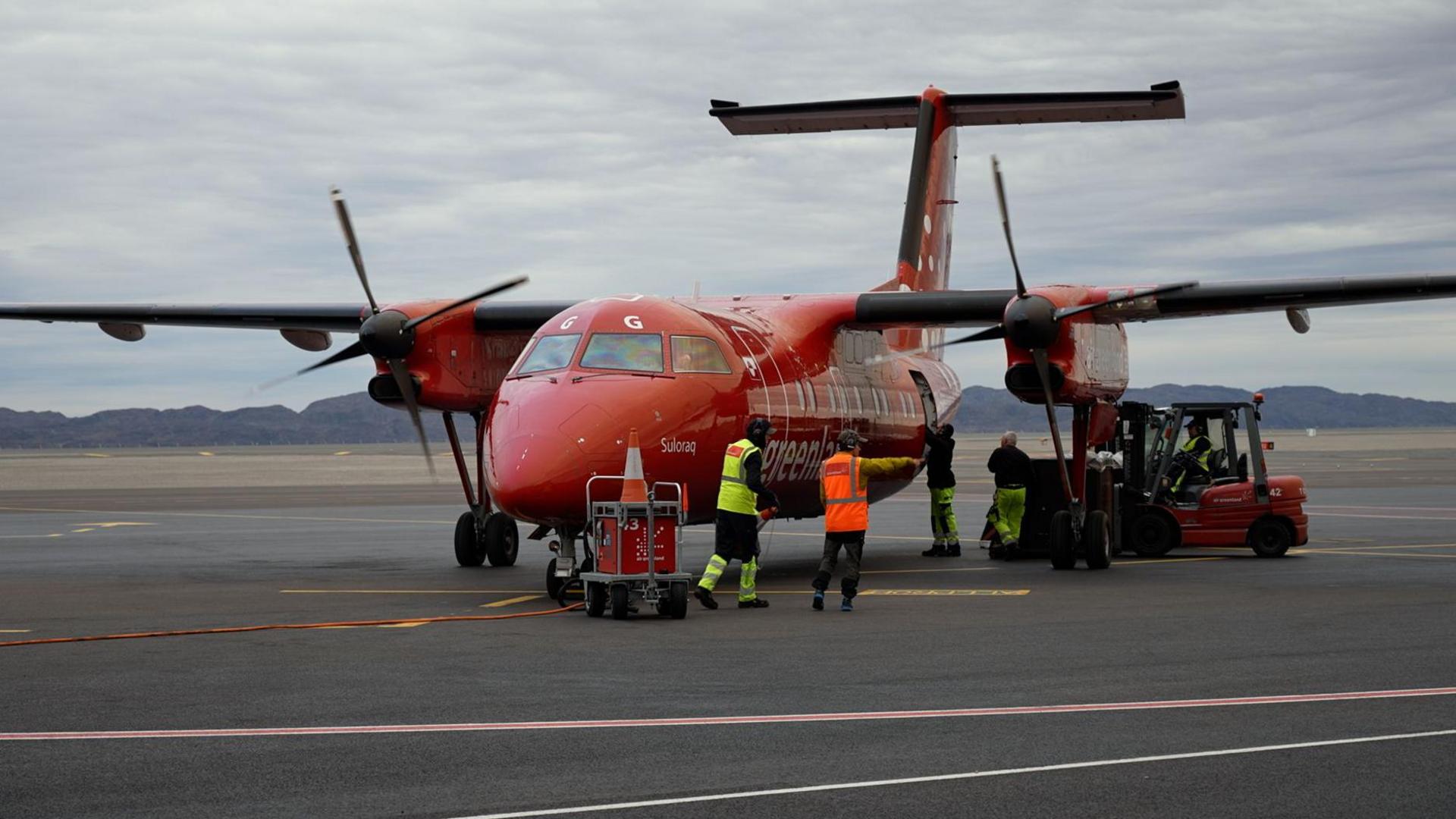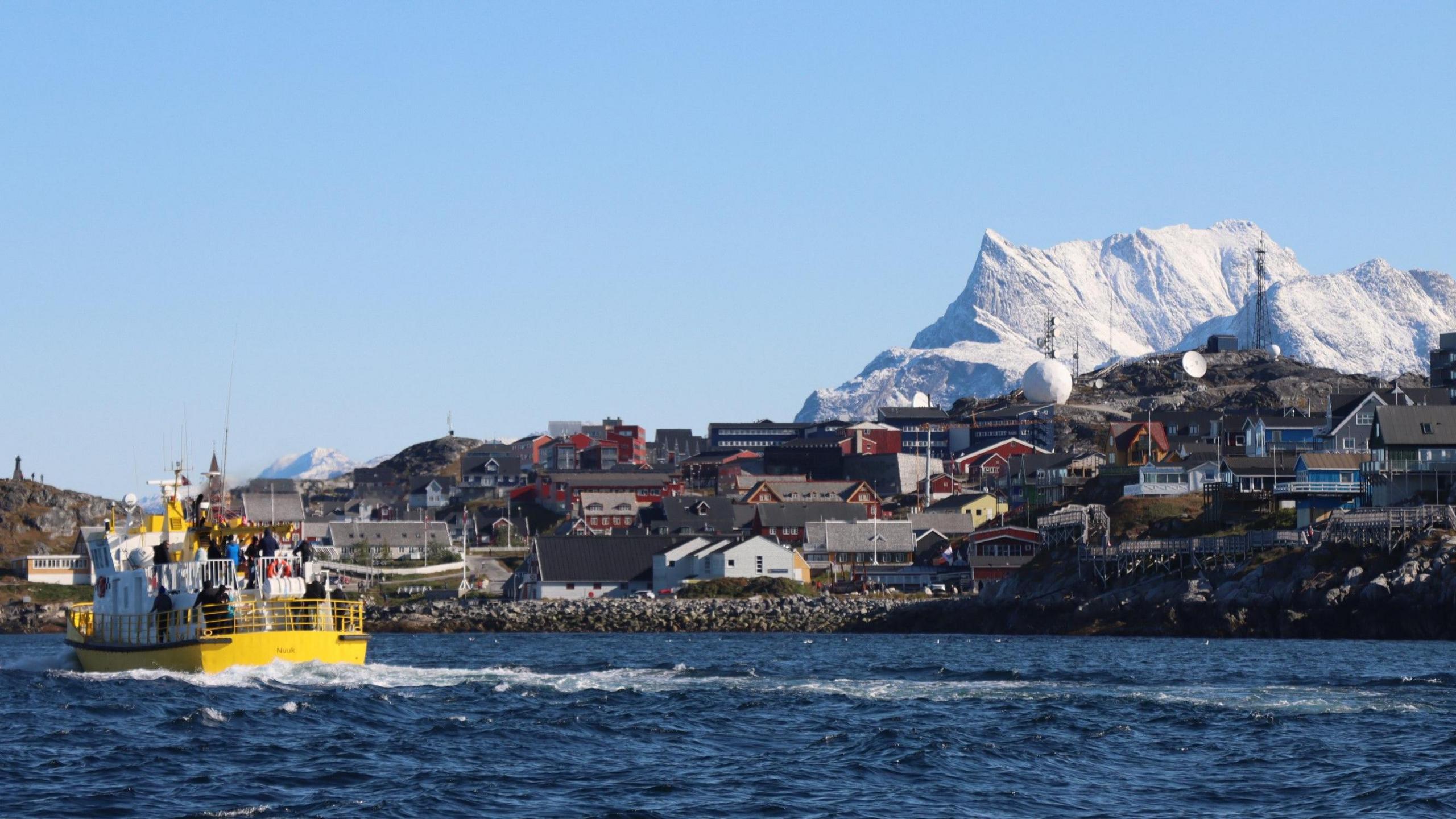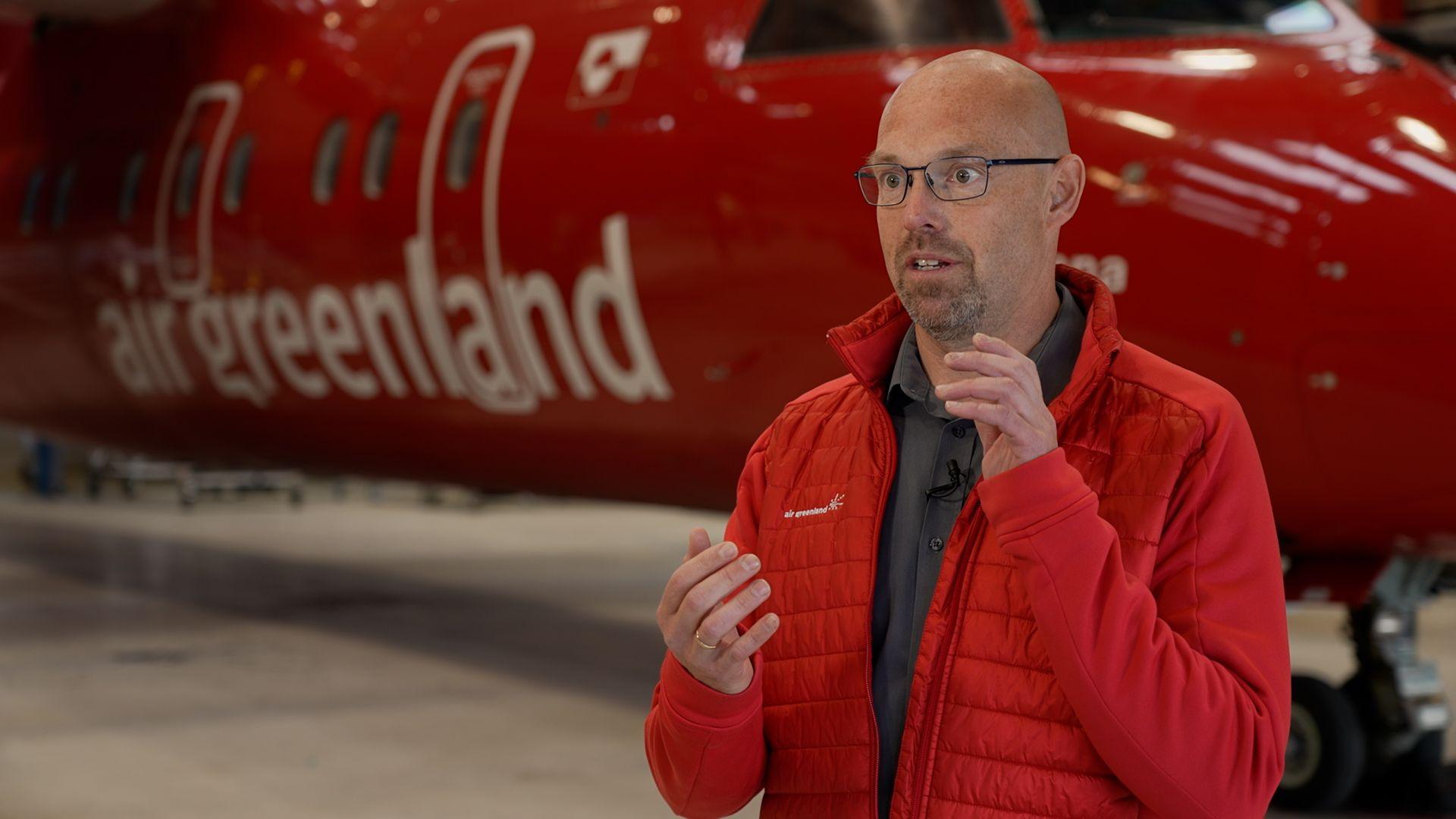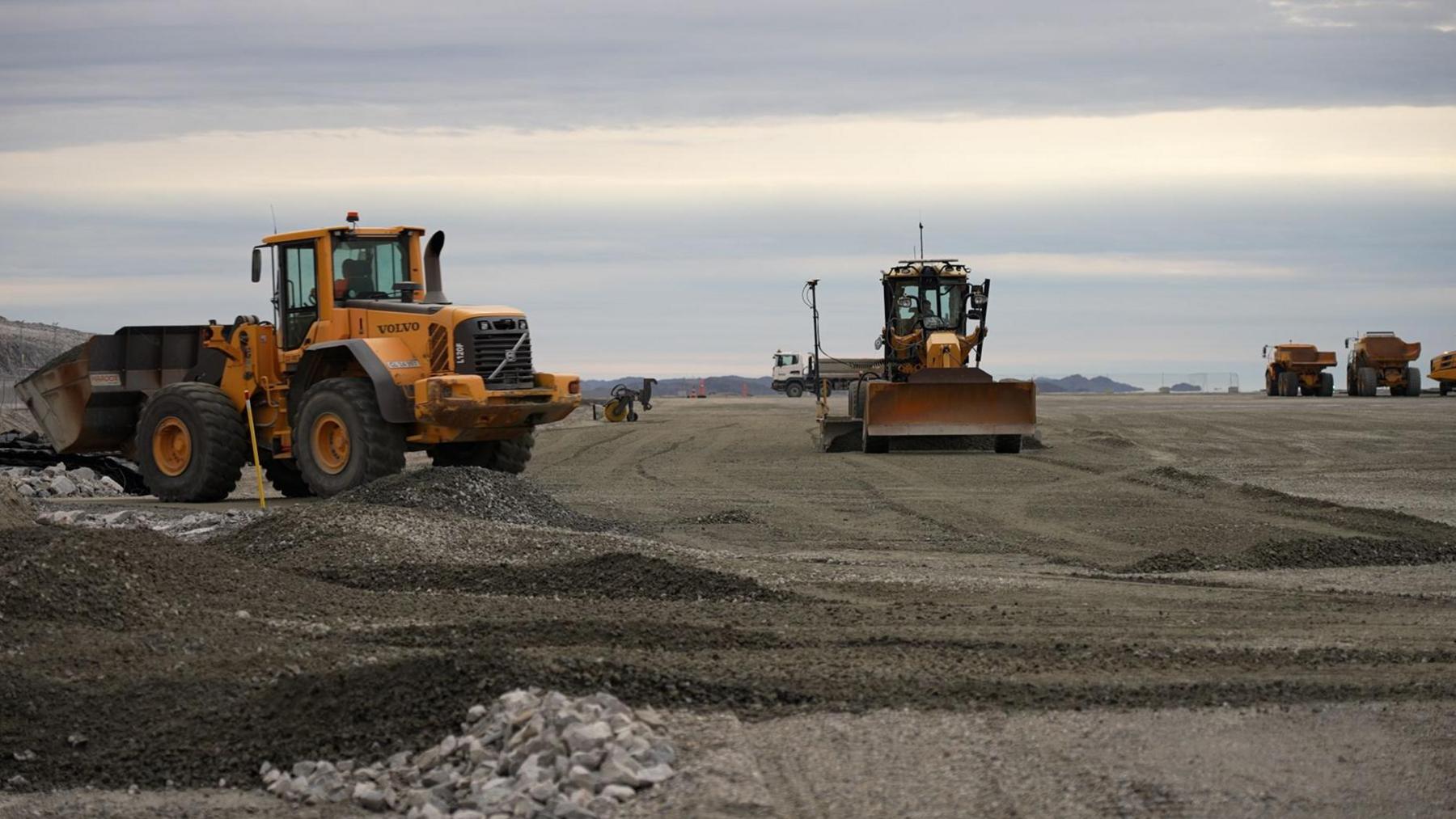Holiday in Greenland? New airports aim to entice tourists

Currently only small planes can take off and land at Nuuk Airport
- Published
A new international airport will soon open in Greenland’s capital Nuuk, allowing larger aircraft to land for the first time - paving the way for direct flights from the US and Europe.
It’s the first of three airport projects that officials hope will boost the local economy, by making the Arctic territory more accessible than ever before.
Covered by an ice cap and sparsely populated, Greenland is a vast autonomous territory within the Kingdom of Denmark.
Its capital Nuuk, on the southwestern coast, is a small town of 18,000 residents. Modern apartment blocks and colourful wooden cottages look out over a wide sea fjord.
Sitting on a hillside above the city, small 35-seat propeller planes take off and land from a tarmac airstrip. Currently anyone wishing to fly overseas first has to take one of these aircraft 200 miles (319km) north to a remote former military airport at Kangerlussuaq, and then change to a larger plane.
Built by the Americans during World World II, Kangerlussuaq is currently one of only two runways on Greenland long enough for big jets. The other is Narsarsuaq in the far south of the country, and that was also a former US military base.
But from the end of November, large planes will be able to land at Nuuk for the first time, thanks to a new longer runway, and a sleek new terminal building.

Greenland has much to interest tourists
“I think it will be a big impact,” says Jens Lauridsen, the chief executive of operator Greenland Airports. “I’m sure we will see a lot of tourism, and we'll see a lot of change.”
As I visit, diggers are shifting piles of rubble along the edge of the extended runway, and the finishing touches are being applied to the new terminal.
From 28 November, direct flights to Nuuk will operate from Copenhagen, carrying more than 300 passengers. And next summer, United Airlines will begin flying from New York, as Nuuk becomes Greenland’s main travel hub.
“We have been shut from the whole world, and now we're going to open to the world,” says one young Nuuk resident. “It's so exciting that we're going to have the opportunity to travel from here to another country.”
In 2026, a second international airport will open in Greenland’s most popular tourist destination, the town of Ilulissat, 350 miles north of Nuuk. Ilulissat is renowned for the huge icebergs that float just off its coastline. A new regional airport, in Qaqartoq, the biggest town in the south of Greenland, will then follow.
Another young Greenlander from Nuuk, Isak Finn, says he won’t miss having to change planes at Kangerlussuaq. “It takes a long time. You have to wait, and then if there's bad weather or not enough planes, you get stuck there. It’s so annoying.”
Jacob Nitter Sorensen, chief executive of national carrier Air Greenland, says that the new international airport in Nuuk is “going to be a big game changer for us”. “It’s going to shorten the travel time, and it's going to decrease the cost of producing the flight.
Ticket prices are already lower, he says, and as demand grows, the airline hopes to add new European and North American routes, and potentially invest in new aircraft. But stiff competition is expected as bigger international airlines enter the market.
“A flight from Europe to Nuuk is a little more than four hours,” says Jens Lauridsen. “From the US East Coast is also four hours. So we're placed right in the middle. There is a very, very big interest from all major carriers in Europe.”
To make way for Nuuk International Airport’s longer runway, six million cubic metres of rock were blasted and levelled. The airport is also now equipped with advanced technology that allows planes to land in the town’s notoriously bad weather.
Cold conditions and the short summer season have been a challenge for construction work. The cost of obtaining explosives also ballooned after war broke out in Ukraine.
The three airports are together costing more than $800m (£615m). This has been partly financed by the Danish, who stepped in with a sweetened loan package after interest from Chinese investors.
“There were concerns about whether this type of investments should be in Chinese hands,” explains Javier Arnaut, who’s the head of Arctic social science at Greenland University. “Denmark offered more affordable and attractive rates for these loans.”

Air Greenland boss Jacob Nitter Sorensen describes Nuuk's new airport as a "game changer"
Initially there was public scepticism over costs and the environmental impact, says Mr Arnaut, but now there’s mostly support. Not everyone welcomes the noisy aeroplanes, however.
“With big infrastructure it always divides people,” Nuuk resident Karen Motzfeldt tells the BBC. “There is always a group who is against, and always a group with who loves it. So it's the same in Nuuk.”
“This is an airport for a modern Greenland,” she adds. “l look forward to having a shorter route for Copenhagen, Iceland, or maybe London Heathrow, who knows?”
Greenland’s economy is largely dependent on the public sector and fishing, and most goods have to be imported, but there are efforts to diversify. Politicians hope this new infrastructure will be a shot in the arm for sectors like mining and tourism.
“In all these cases, infrastructure is key. It makes everything easier,” says Naaja Nathanielsen, Greenland’s Minister of Business, Trade and Mineral Resources, adding that, the ease of travel will also help the government grow bilateral relations.
With larger cargo planes soon to be able to land in Nuuk, more goods can come in, and exports can more easily go out.
Greenland profile
- Published10 January
Inside a harbourside factory in the capital, a huge catch of prawns is being steamed, shelled and frozen. For its owner, Greenlandic company Polar Seafoods, which sells shrimps, crab and halibut, shorter and direct flights mean new business possibilities.
“We’re looking into doing more fresh seafood,” says chairperson, Michael Binzer.
Currently their products are exported in frozen form by container ship, destined for markets like China, Scandinavia and the UK. But the company has been trialling airfreight ahead of the new airport opening.
However, it’s tourism that will be the big winner. Foreign visitors came to Greenland in record numbers last year, rising 36.5% from 2022, to more than 140,000. That’s still modest, but with more flight options it is projected to grow.
“We are already in a tourist boom, and feeling how tourism can affect smaller places in a good way, but also negatively,” says Ms Nathanielsen, who’s overseeing a new tourism law that will be introduced this autumn.
“We really want to try to welcome the tourists in the bigger cities, but we also want to spread them out more.”

Much excavation work has been carried out to extend Nuuk Airport's runway
In Nuuk, many tourism businesses are eagerly preparing. “Everyone is very excited about how it's going to be,” says Maren-Louise Paulsen Kristensen, co-owner and manager of Inuk Hostel.
The business has invested in new glass igloo huts to attract tourists year-round.
Elsewhere, new hotel plans are slowly emerging, but a shortage of accommodation could still put the brakes on efforts to expand tourism. Ms Kristensen says Nuuk needs more rooms, local guides and workers.
Yet she is also concerned that Greenland may “develop tourism too fast... that happened in Iceland, so I think we have a lot of things we can learn from them.”
Business Minister Naaja Nathanielsen says the new airports will have a “profound” impact on the local society. “I sense that it's going to really change the map of Greenland.
“This will bring a lot of good, but also some changes we’ll probably need to adjust to.”